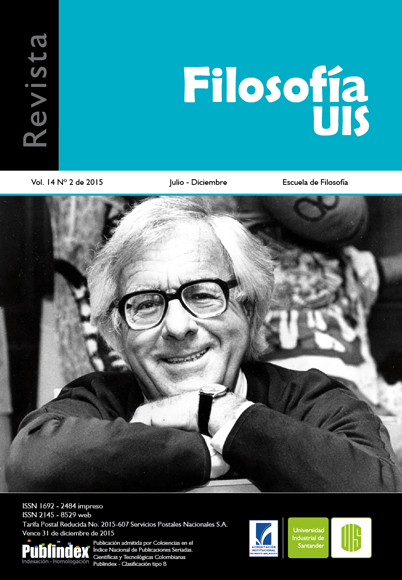Published 2015-12-03
Keywords
- resources,
- teaching,
- philosophy,
- education
How to Cite
Copyright (c) 2015 José Eriberto Cifuentes Medina

This work is licensed under a Creative Commons Attribution 4.0 International License.
Abstract
The concern of teachers for teaching philosophy has been incessant, so that we have designed a proposal that addressed the process from the teaching philosophy of secondary education. Research from the classroom seeks knowledge to solve problems of teaching the history of philosophy and philosophical authors of every age and schools, through games like: philosophical parks, Poker, Keno, Chess, Tasos, Monopoly, rich uncle, Album, philosophical Dictionary, Bingo, Bulletin, Stairs, Domino, Videos; among others in order to develop their creative, methodical, reasoned, orderly, abstract, meditative, deliberative and speculative thought.
Developing teaching resources for teaching the history of philosophy has become an experience of successful character has also been innovative as it has helped students of different levels to respond effectively to academic life and the examination of Saber 11th. Therefore the research question is: What educational improvement strategy could arise for the philosophical training of high school students to qualify their learning and comprehensive training?
Downloads
References
- Caicedo, Y. et al (2010). Pedagogía y Currículo. Seminario Permanente de Pedagogía. Tunja: Imprenta y publicaciones – UPTC.
- Corrales, M. (2008). Metodología de la formación abierta y a distancia. Balderas: Editorial Limusa, S. A.
- De la Torre, Z. (2009). 12 Lecciones de pedagogía, educación y didáctica. México: Editorial Alfaomega.
- Gómez, M. (1997). Didáctica de la Filosofía. Santa Fe de Bogotá: Universidad Santo Tomas USTA.
- González, A. (1969). Historia de la Filosofía: En cuadros esquemáticos. Madrid: Ediciones EPESA S. A.
- Islas, N. (2012). Didáctica Práctica: Diseño y preparación de una clase. México: Editorial Trillas.
- Lucio, R. (2009). La gestión de la enseñanza y el aprendizaje. Seminario Permanente de Pedagogía. Tunja: Imprenta y publicaciones – UPTC.
- Lozano, R. (2005). El éxito en la enseñanza. México: Editorial Trillas
- Ley 115 de 08 de Febrero de 1994. Por la cual se expide la Ley General de Educación. Bogotá D. C. Colombia: Ediciones Momo.
- Morales, G. et al (1999). Sé tú mismo, aprende a ser persona. Trabajo de grado para la especialización en docencia universitaria, Bogotá: Universidad Militar Nueva Granada.
- Morales, B. (2006). Filosofía 10°: Aprendiendo a filosofar con competencias. Bogotá: Editorial Paulinas
- Morales, B. (2002). Filosofía 11°: Aprendiendo a filosofar con competencias. Bogotá: Editorial Paulinas
- Páez, E. (2010). A propósito de la didáctica: Salir del aula, entrar al aula. Seminario Permanente de Pedagogía. Tunja: Imprenta y publicaciones – UPTC.
- Ramón, A. (2006). 10 Claves de la Educación. México: Editorial Trillas.
- Suárez, D. (2010). La educación. Estrategias de enseñanza - aprendizaje, teorías educativas. México: Editorial Trillas.
- Suarez, M. (2003). Pienso… Filosofía y su Historia II. Bogotá: Editorial Voluntad. Educación Media.
- Verano, G. (2004). Pienso… Filosofía y su Historia I. Bogotá: Editorial Voluntad. Educación Media.
